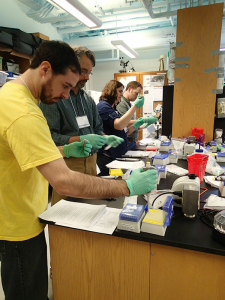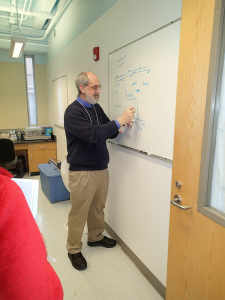The North Carolina Biotechnology Center funded NOAA and academic researchers to develop a training facility for public health officials and resource managers in advanced molecular methods to detect pathogens and harmful algae species more quickly and effectively.

Sixteen participants from public health departments and academic institutions gathered to complete training to detect Enterococcus. Credit: NOAA.
The first workshop, held March 11–15, 2013, covered quantitative polymerase chain reaction techniques to detect Enterococcus, the primary bacterial indicator of human fecal contamination of recreational waters. Similar methods for detecting harmful algal blooms were taught at workshops in Alaska and Malaysia last year.

NOAA's Wayne Litaker lecturing on assays that detect waterborne pathogens and harmful algae species. Credit: NOAA.
These workshops grew out of requests from numerous user groups who were interested to learn how to implement new quantitative molecular detection methods in their laboratories and a desire to train individuals developing biotechnology businesses in eastern North Carolina.
Sixteen participants from public health departments and academic institutions in Alabama, California, Florida, New York, North Carolina, Maryland, Ohio, Texas, Vermont, and Virginia gathered in Morehead City, NC to become the first class to complete training.
Experts from NOAA's National Centers for Coastal Ocean Science and University of North Carolina (UNC) led the workshops at the new Molecular Training Facility at the UNC Institute of Marine Sciences.
The next workshop is scheduled for November 2013.
 Official websites use .gov
A .gov website belongs to an official government organization in the United States.
Official websites use .gov
A .gov website belongs to an official government organization in the United States. Secure .gov websites use HTTPS
A lock or https:// means you’ve safely connected to the .gov website. Share sensitive information only on official, secure websites.
Secure .gov websites use HTTPS
A lock or https:// means you’ve safely connected to the .gov website. Share sensitive information only on official, secure websites.